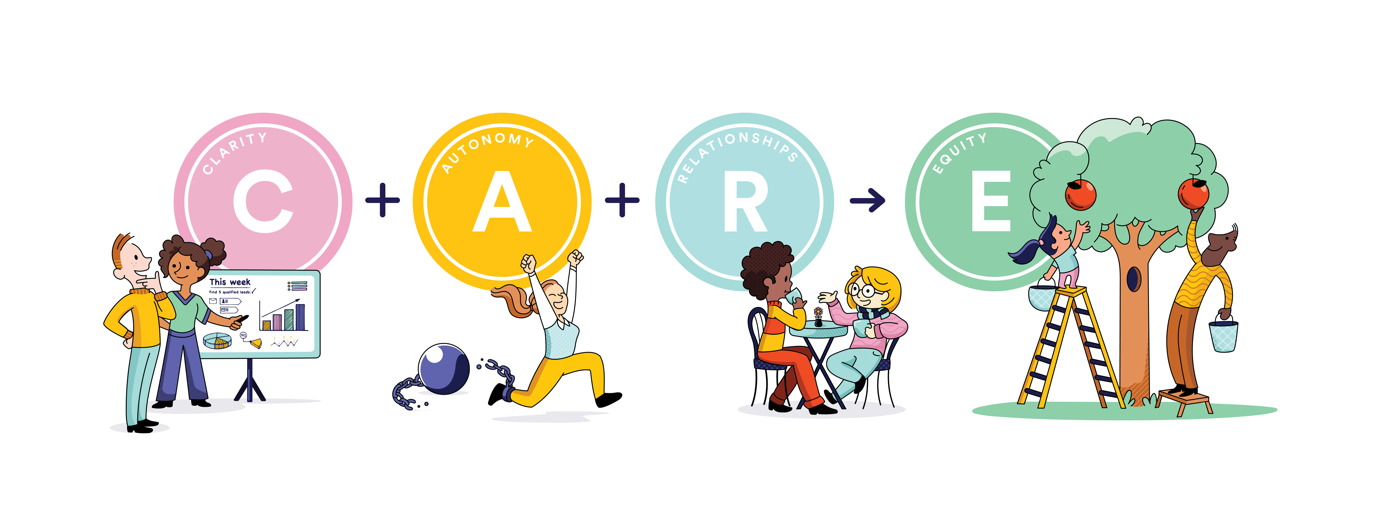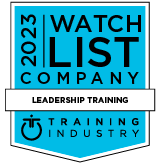Does AI CARE? Human Leadership in the Age of Automation

Contents
Does AI CARE? Human Leadership in the Age of Automation
AI does not CARE. It will never CARE. Period.
At home, AI plays our favorite songs, curates personalized recipes, sends us targeted ads for sneakers, enhances security with advanced monitoring systems, and can track our health with wearables and home devices. It's become an integral part of our daily lives, like a handy personal assistant. However, when it comes to AI and culture in the workplace, things get a bit more complex.
Culture is a living, breathing organism. It has a major influence on whether fresh talent will take a second glance at your company and if existing talent is intrinsically committed to the cause and not on LinkedIn looking for a new job. But take your eye off it for one minute, and that organism can become diseased. Your people are the fuel for your organization, and if the culture has roots of toxicity, they’re going to be running on fumes, and out the door.
Enter AI, the all-in-one solution to broken cultures, right? Wrong.
AI in the workplace may be capable of creating marketing strategies, building learning courses, hiring, predicting trends, assisting with data analysis and automation, and making financial decisions. But quite simply, AI doesn’t CARE. Humans do. AI is not going to replace our human leaders.
72% of executives think AI will become the most significant business advantage in the future (Authority Hacker). But our future is one where business and humans need to co-exist. Too much of one without the other and challenges arise – challenges that AI won’t be able to solve. Still only 29% of employees perceive their leader as demonstrating human leadership (Gartner).
AI and culture are about balance. Clarity, Autonomy, Relationships, and Equity® (CARE) is about bringing balance to teams. Simple. Agnostic. Human-centered, yet performance-focused. It’s about securing and maintaining a competitive advantage from the humans in your organization that are here to stay – which is the reason any business is interested in AI, right?
AI's Efficiency vs. the Human Touch
AI in the workplace can analyze vast amounts of data in seconds, generate simulations, predict outcomes, and provide incredible insights that drive business strategies. It can organize meetings, draft emails, and automate those repetitive tasks that no one likes doing, saving time and allowing employees to focus on high-value work instead. AI’s impact on employees includes enhanced collaboration and communication and even predict project challenges by learning from past communications, increasing efficiency even further. It's no wonder that 80% of retail executives plan to adopt AI automation by 2025 (Authority Hacker).
But, and it’s a big but – AI falls flat on its face when it comes to the human side of leadership and trust. AI’s impact on employees can damage culture too. 55% of employees are “somewhat” to “extremely” uncomfortable with AI delivering negative feedback (Potential Project). It can’t understand human behavior and emotions or display empathy and practical common sense. That lack of emotional intelligence means it can’t build trust and loyalty or navigate complex interpersonal dynamics to enhance collaboration.
AI in the workplace can’t offer support to an employee who is grieving or one who is feeling the strain of a big project. It can't celebrate a team’s victory with genuine enthusiasm or offer customers and clients the personalized, human touch that they expect. These nuances of human interactions foster a psychologically safe and vibrant culture.
Impacts of AI on Company Culture
- Employees using AI report an 80% improvement in productivity (Slack).
- Programmers coded 126% more projects per week (Nielsen Norman Group).
- Business pros wrote 59% more work-related documents per hour (Nielsen Norman Group).
- Customer service agents answered 13.8% more inquiries per hour (Nielsen Norman Group).
As well as operational efficiency, AI in the workforce can also analyze individual performance and learning styles to churn out personalized learning and development plans, tailored to each employee's unique skills and aspirations. Aligning personal growth with organizational growth fosters a sense of purpose and belonging in each person, and those diamonds of yours can turbocharge their journeys, ensuring a strong and consistent talent pipeline.
AI in the workforce can create customized onboarding experiences for faster productivity so that everyone feels valued, heard, and understood from day one. AI in the workforce can detect patterns in employee surveys and exit interviews that the human eye might miss. It can transform those dreaded (they shouldn’t be – find out why here) annual reviews into a dynamic, ongoing conversation.
But when it comes to AI and organizational culture, it’s a double-edged sword. AI also raises significant challenges that it cannot solve; challenges that need addressing by human leaders to maintain a healthy culture.
Addressing Interpersonal Challenges
Leadership involves more than just making strategic decisions; effective leadership is 10% work, 90% relationships. It's about nurturing relationships and building a cohesive and collaborative workplace environment. This requires the human skills to get the hard stuff done: we call this CARE; providing clarity, giving autonomy, building relationships, and ensuring sufficient levels of equity. Leaders need to do what AI cannot, CARE for their teams.

Providing the right levels of CARE equips leaders with the ability to motivate and connect with other humans on a personal level. These human-centered aspects of leadership are crucial for maintaining a positive and productive organizational culture.
AI for work can provide deep insights into employee behavior, preferences, and satisfaction, meaning that it can pre-emptively identify anyone at risk of leaving. However, its lack of emotional intelligence can actually lead to misunderstandings and miscommunications within teams. Again, AI doesn’t care. Over the top levels of IQ, with Zero EQ = big problems when it comes to leadership.
Human leaders can read between the lines of verbal and non-verbal cues, address conflicts sensitively, and provide tailored moral support. Without these human touchpoints, you’ll end up with stagnant, fractured cultures where you don’t need an employee survey to tell you that most feel undervalued, unheard and isolated. Without motivated, engaged, and happy employees, who’s going to run your customer service division or code your robots in the future? The lower your engagement levels, the lower your customer satisfaction. You need happy employees, as much as much as you need happy customers.
Job Displacement Concerns
AI’s ability to imitate elements of human function and carry out day-to-day tasks understandably has some people shaking in their boots. I don’t think there’s a single person out there who hasn’t Googled ‘Will AI take over my job?’
Artificial intelligence in the workplace could displace 75 million jobs by 2025. 375 million people may need to change careers by 2030. By 2030, intelligent robots may replace 30% of the global workforce. Such statistics can create a lot of anxiety among teams.
We need human leaders to alleviate these fears and build trust and psychological safety around AI for work. If leaders don’t communicate transparently, guide people through that change and address these fears head-on with CARE, teams will divide, cultures will crack, and all your good people and talent will fall into the void.
Ethical and Privacy Issues
60% of businesses using AI aren't developing ethical AI policies, and 74% fail to address potential biases – biases that all humans have. Artificial intelligence in the workplace can reflect these biases, leading to discriminatory hiring practices, for example.
AI's ability to process vast amounts of data also raises privacy concerns. How is employee data being used? Is it being protected adequately?
When leaders understand how to lead with CARE, they can guide AI and organizational culture to ensure inclusive, equitable and ethical workplaces.
Sustaining Human Leadership in an AI-Driven World
How leaders turn up and lead either creates or destroys culture – there is no neutral. The most important lever for shaping culture? It’s leaders setting an example, modelling the way forward. When you lead like Ted Lasso rather than Michael Scott, you get improved team collaboration, enhanced communication, more trust and engagement, increased innovation, and ultimately, greater organizational success. You create psychological safety.
Leaders who prioritize managing over relationships are 32% less engaged, 1.5 times more likely to feel burned out by the end of the day, and 2 times more likely to leave within 12 months (DDI World).
A leader who doesn’t understand, empathize, or care and is only focused on themselves – we’ve all known one – may as well be an AI bot. AI in the workforce calls for an evolution in leadership. We need people-first leadership to ensure that organizations don’t lose the personal touch that fosters a positive workplace culture.
Maintaining Human Elements in an AI-Driven Workplace
The future belongs to organizations that leverage the strengths of both humans and AI. This is where the magic happens. By combining AI's efficiency with human leadership's emotional intelligence, we can unlock a new era of high-performing, people-centric organizations.
How do we do that? How do we ensure harmony between AI and culture? With CARE: Clarity, Autonomy, Relationships, Equity®.
Clarity: Just one word can mean one thing to someone, and something entirely different to someone else. We might not be running from saber-tooth tigers, but our brains still see any uncertainty and ambiguity as a threat. Ambiguity drives fear, and that makes people scared to speak up and share important information with those who need it to make better decisions. It’s about aligning others by fully communicating expectations and creating a shared understanding of success.
Autonomy: Innovation is vital for any organization's survival in the AI era. Effective human leadership involves creating a culture that encourages initiative, creativity and risk-taking, ensuring employees have the resources, training and infrastructure needed to explore and contribute new ideas. When someone tries to control us, our threat circuitry is triggered. Autonomy is earned and fostering that autonomy to create cognitive ease is on leaders’ shoulders.
Relationships: Human leadership is about showing up as an authentic human being with vulnerability, imperfections, and often without all the answers. “It’s about knowing people between the lines,” as Matthew McConaughey says, by having intentional conversations at work, connecting with your team on a human level, and meeting them where they are at. What if that employee who struggles with speaking up had a traumatic past boss? Their current leader would act differently, and not put their guard up based on assumptions.
Equity: Fairness and respect are what young talent looks for. But if I don’t know what makes individuals unique, how can I treat them how they want and need to be treated? The more fairness a team feels, the more they will step up and help each other – and you – out. The Default Equality bias means our brains default to equality, but one or two people will go home with a sense of unfairness that will trigger disgust in their brain. That one unhappy (they’re not ‘bad’!) apple can rot the whole basket. Leaders need to adapt support based on each person’s unique needs, so everyone goes home feeling seen, valued, and heard. The more they get what they need, the more intrinsic motivation you trigger.
It’s the formula for success for both AI and culture. C + A + R consistently and effectively over time are predictors of E. Equity drives fairness, and that’s where higher performance and psychological safety lives. That’s how you differentiate yourself and your organization in the technology revolution.
Training and Development for AI Adaptation
When it comes to AI transformation in business, learning and adaptation must be key ingredients in any culture. We’re not just talking about upskilling employees. Most leaders have the IQ, but not the EQ. It’s crucial they learn how to complement AI tools, while making sure they don’t lose the human connection.
The CARE Experience® provides current and aspiring leaders with an unbiased language of effective leadership and a science-based leadership toolkit. These are simple, actionable strategies for cultivating a human-centered, performance-focused culture in an AI-enhanced workplace. It’s a structured approach to enhancing EQ.
When leaders truly CARE they create a psychologically safe space that is more supportive, collaborative, and responsive, for their teams to thrive. One in which they can speak up early and often about what’s important to them, and what they need and aren’t getting from leaders, so they can show up every day as their best selves and deliver their best work.
It means those people will go home to friends and family and not worry about work or their boss over dinner. They’ll feel happy, maybe even excited, about clocking in every morning, because it’s a space where they have purpose and feel motivated and empowered. They’ll feel supported and valued in the face of the scary change that is AI transformation in business. Imagine that?
Outlook: AI’s Evolving Influence on Culture
While AI brings remarkable efficiencies and innovations to company culture, it can’t replace our human leaders. We need that humanness more than ever to preserve the human touch in the workplace.
AI transformation in business presents us with an opportunity to be more human; an opportunity to CARE, to win. Win at culture, win at leadership, and win at AI. The more consistent the CARE, the stronger the culture. The stronger the culture, the better teams will perform.
The CARE Experience® can guide you in developing a balanced approach to AI and culture. By complementing the irreplaceable qualities of human leadership with AI's capabilities, you can drive efficiency and create a thriving and unique, human-centric, performance-based culture.
Order our Founders Book, CARE to Win, to learn more about CARE.
FAQs
What are the effects of AI in company culture?
AI can increase efficiency, drive innovation, and personalize employee experiences, but it also poses challenges such as job displacement, ethical concerns, and the potential loss of human-centered leadership elements – elements crucial to success in an AI world.
How can companies mitigate AI's challenges in the workplace?
Embrace CARE: Clarity, Autonomy, Relationships, Equity. By combining AI's efficiency with human leadership's emotional intelligence, we can unlock a new era of high-performing, people-centric organizations.
What strategies can enhance AI ethics and privacy in company culture?
Leaders need the human touch so they can oversee AI development, implementation, and data usage, to protect employee data, ensure transparency and foster a culture of integrity, ethics and trust.
Insights

Subscribe to Our Monthly Newsletter!
For managers and talent professionals who truly believe in putting people first, the CARE to Win blog is your gateway to the latest insights on human-centric leadership. Join us as we champion the people first movement.
Need some time apart? Are we emailing you too often? Just give us your feedback, and we promise we’ll respond. We really do care. And if it’s still too much, just unsubscribe. It’s cool.



